 About GamePeople
About GamePeople
Subscribe to the Story Gamer column:![]() RSS or
RSS or
![]() Newsletter.
Newsletter.
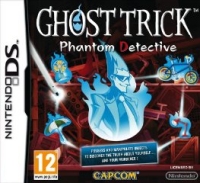
Format:
DS
Genre:
Adventuring
Style:
Thirdperson
Singleplayer
Further reading:
Pomeranian
Buy/Support:
Support Mark, click to buy via us...
Other GamePeople columnists have reviewed this from their perspective - huh?:
Family Gamer (DS)
Teen Gamer (DS)
Tech Gamer (DS)
Reporting Gamer (DS)
Microcosm Gamer (DS)
Novel Gamer (DS)
Odyssey Gamer (DS)
Reluctant Gamer (DS)
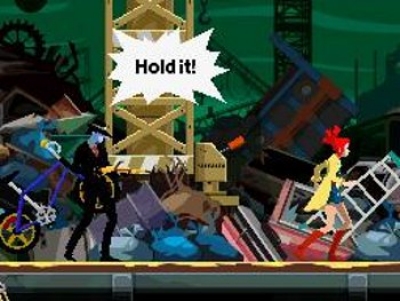
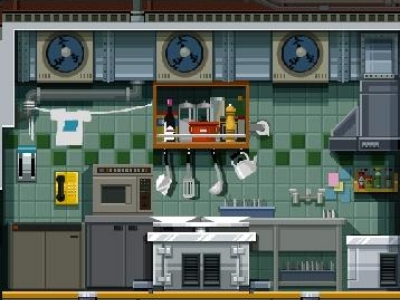
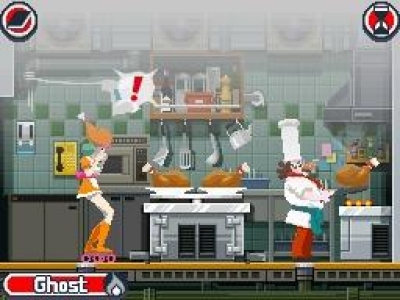
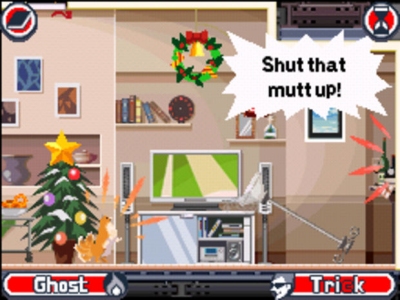
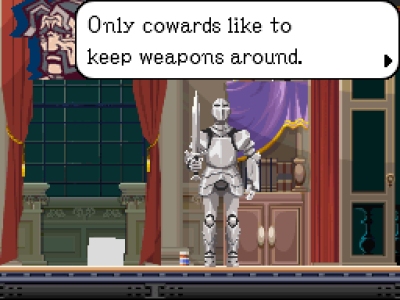
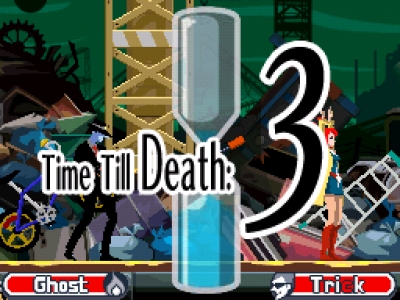
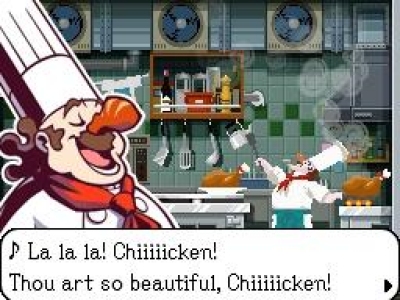
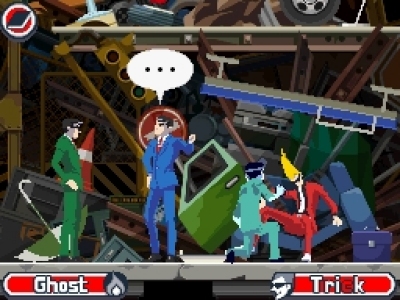

Further reading, films and books that create similar stories:
Ghost Trick: Phantom Detective DS is a fantasy murder mystery with great characters, a compelling plot and writing as sharp as its hero's pointy haircut.
Sissel was dead, to begin with.
Murdered in a junkyard on the edge of town, this cone-haired, red-suited mystery man finds himself stuck as an amnesiac ghost, with only the hours before dawn to unravel his personal mystery and find out not only who killed him, and why, but who he really is.
Fortunately for the unfortunately deceased Sissel, he has the power to perform Ghost Tricks, rewinding time and manipulating nearby objects to change the fates of the recently deceased, averting their demises. With assassins on the loose and a nefarious plot unfolding, there are many deaths that need undoing if Sissel is to crack the case before daybreak.
Ghost Trick is from the mind of Ace Attorney creator Shu Takumi, and shows many of the hallmarks of that series. There's the genre-bending, for a start: Ghost Trick combines a detective story with a supernatural twist, but also brings in elements of espionage and science fiction.
The latter is important: as opposed to Ace Attorney's quasi-religious exercises in mediumship and possession, the ghostly phenonmena in Ghost Trick are less spiritual and more mechanical. Sissel's powers my have unearthly origins but work in a tightly defined way. Ghost Trick is a science fantasy, where even the most outlandish events have a (vaguely) scientific explanation.
By creating a clear sense of rules, albeit rules that are expanded and built upon throughout the game, Takumi and his team create a sense of fairness in the game. The world of Ghost Trick is internally consistent and not an anything-goes free-for-all of wizards and witches and other fantasy creatures.
Even the most demented plot twist gradually locks into place in a story that ties itself up very neatly.
This is not to say that the game's plot lacks surprises and curveball revelations, and indeed there's a few absolute 'what the...?' moments that left me completely baffled as to where the story was going. However, even the most demented plot twist gradually locks into place in a story that ties itself up very neatly by the conclusion.
Ghost Trick's story structure ensures that, within the wider narrative and mystery of the game, each chapter is a satisfying self-contained scenario. Thanks to Sissel's ability to rewind time to four minutes before a victim's death, each puzzle is a little time loop: it starts in the present with a corpse, then rewinds to before the death, and that death is replayed and replayed until Sissel succeeds in changing fate.
Only when the death is averted can Sissel return to the present, and time can move on as a new destiny is created. Although each violent death is eventually undone, the constant murders and fatal accidents do make for a jet-black core at the centre of Ghost Trick's story, a feeling of fatalistic gloom as each killing is undone, only to open the way to the next death. There's a certain black comedy to this cycle, and the story neatly balances light and dark, humour and threat, death and revival.
Preventing a death is a matter of solving an environmental puzzle, manipulating objects around the (soon-to-be) crime scene. Seen from a rigidly side-on cutaway perspective, environments are busy with useful objects for Sissel to possess and manipulate, with books teetering on shelves, items hanging from hooks and gaskets and pipes in the walls.
The story neatly balances light and dark, humour and threat, death and revival.
It's a world full of detail, presented as charming technical cross-sections. To solve a puzzle and prevent a death involves good planning and timing: time is frozen while Sissel moves between objects, but to perform each object's 'trick' involves letting time flow again - and each passing second counts down to the moment of death.
Thankfully, penalties for failure are one mechanic from the Ace Attorney games that haven't been inherited by Ghost Trick, and time can be rewound as many times as it takes, without any punishment. Each stage is well-balanced between providing a substantial challenge and being snappy enough that constant repetition isn't a problem.
The mechanical nature of the puzzles means that the kind of illogical solutions that plagued the Ace Attorney series are rare, and even the occasional head-scratcher is soluble through applied trial and error - the contained environments mean there are only a limited number of routes Sissel can take, so you'll hit upon the right one sooner or later.
One quality of Ace Attorney staple that reverberates through Ghost Trick is Takumi's knack for creating utterly appealing and witty characters. The design approach and graphical style are different to that series. Character designs are spikier, more angular, with thick black outlines.
The characters really come to life in longshot, moving through those diagramatic environments
While conversations are conducted in cartoony close-up with limited frames of animation, the characters really come to life in longshot, moving through those diagramatic environments. Figures have long, loose limbs and move with naturalistic fludity, striking distinctive poses that nonetheless feel entirely real. It's a fitting style for characters who combine larger-than-life characteristics with a convincing humanity.
At the centre of the story is Sissel, another of Takumi's sharp-suited, silly-haired straight-man protagonists, with the same straightforward integrity that characterised Phoenix Wright and Apollo Justice. Sissel is sufficiently likable that, as he discovers more about his ever shadier life, you find yourself worried about him -- hoping your worst suspicions aren't true.
Whenever Sissel encounters another body, he can psychically communicate with their ghost, and that line of communication continues after their death has been averted, leading to a widening cast of characters as the game goes on.
Sissel most frequently finds himself saving the game's female lead, Lynne. She's another stock Takumi character type, the chirpily deranged female sidekick. Aside from being a police detective, Lynne's main quirk is an endearing optimism in the face of being repeatedly killed, and her brusque insistence that Sissel get on with averting her latest sticky demise.
Although the Sissel/Lynne dynamic - he dealing out deadpan one-liners as she comes out with eccentric observations - will be extremely familiar to Ace Attorney fans, but it's a dynamic that works, works well, and continues to work here, with a sparky frisson between the two characters.
Missile may well end up being the videogame character debut of 2011, he's that memorable.
Surrounding the core duo are a range of eccentrics, each with their signature schtick but enough humanity to be endearing even as their eccentricities can begin to grate. There's a dancing detective who pirouttes through every case, a romance author who clinks her wine glass in congratulation whenever she sees something she admires, an overenthusiastic environmentalist with a spherical haircut and a scientist with a pigeon on his head.
Then there's Missile.
Missile is the ghost of a Pomeranian who Sissel meets early in the game, after he's shot defending his owner
Just to repeat that last bit if your brain understandably rebelled against what your eyes were reading, he's a ghost Pomeranian, a literal dead dog. Missile can speak to Sissel because, in a wonderful example of the game's consistent but batty ghost-logic, psychic communication between the dead transcends language, so the fact that humans speak and dogs bark is no longer a barrier.
Missile the ghost-dog is a fantastic character, bouncing around with canine loyalty and the boundless, ineffectual energy of his breed. He's funny, cute and endlessly endearing. He may well end up being the videogame character debut of 2011, he's that memorable.
It takes assured execution and real creative talent to turn a ghostly Pomeranian into a compelling character who the player really cares about, but Ghost Trick manages it. It's another near-miracle in a game that also manages to include an actually enjoyable and exciting stealth section, amongst other novelties.
It's also the perfect handheld game, one with accessibly brief levels and endearing characters you want to hug close to you rather than sit watching on a TV screen. As developers begin to migrate to the 3DS, a game like this is an excellent reminder of what the 2D model is capable of.
The story and characters are bound together by a recurring theme of redemption and second chances
Ghost Trick: Phantom Detective is a great story-based game, one where the gameplay elements are wholly integrated into the plot, and where the story itself is an involving cross-genre hybrid of murder mystery and supernatural fantasy. The story and characters are bound together by a recurring theme of redemption and second chances, and as the story progresses their lives are revealed to be increasingly intertwined, what seem like incidental details tying together to reveal a single instigating event as the origin of everything that'shappened to these people.
My mangling of the first line of Dickens' A Christmas Carol above wasn't just another of my assaults on literature: as a time traveling ghost story about correcting bad life decisions, Ghost Trick hits on a lot of similar themes. However, while Scrooge could only change his life from the present onwards, Sissel can change events in the past to create a better present rather than just a rosier future. It's one of those examples where a game has different story demands than a book: a reader may be content for Scrooge to change his outlook, while a player wants their actions to have more immediate, tangible consequences.
Ghost Trick's combination of strong story and satisfying gameplay means that those consequences feel well-won, and by the end I was glad not just to have beaten the game as a personal victory, but to see the outcomes for a cast of characters I'd grown incredibly fond of.
Highly, highly recommended.



Mark Clapham writes the Story Gamer column.
"I love a good story. Games tell many different stories: the stories told through cut scenes and dialogue, but also the stories that emerge through gameplay, the stories players make for themselves."
Here are the games I've been playing recently:
© GamePeople 2006-13 | Contact | Huh?

|
Family Video Game Age Ratings | Home | About | Radio shows | Columnists | Competitions | Contact
With so many different perspectives it can be hard to know where to start - a little like walking into a crowded pub. Sorry about that. But so far we've not found a way to streamline our review output - there's basically too much of it. So, rather than dilute things for newcomers we have decided to live with the hubbub while helping new readers find the columnists they will enjoy. |
Our columnists each focus on a particular perspective and fall into one of the following types of gamers:
|